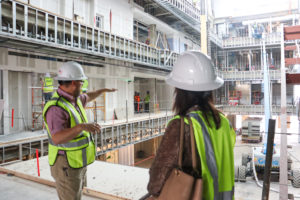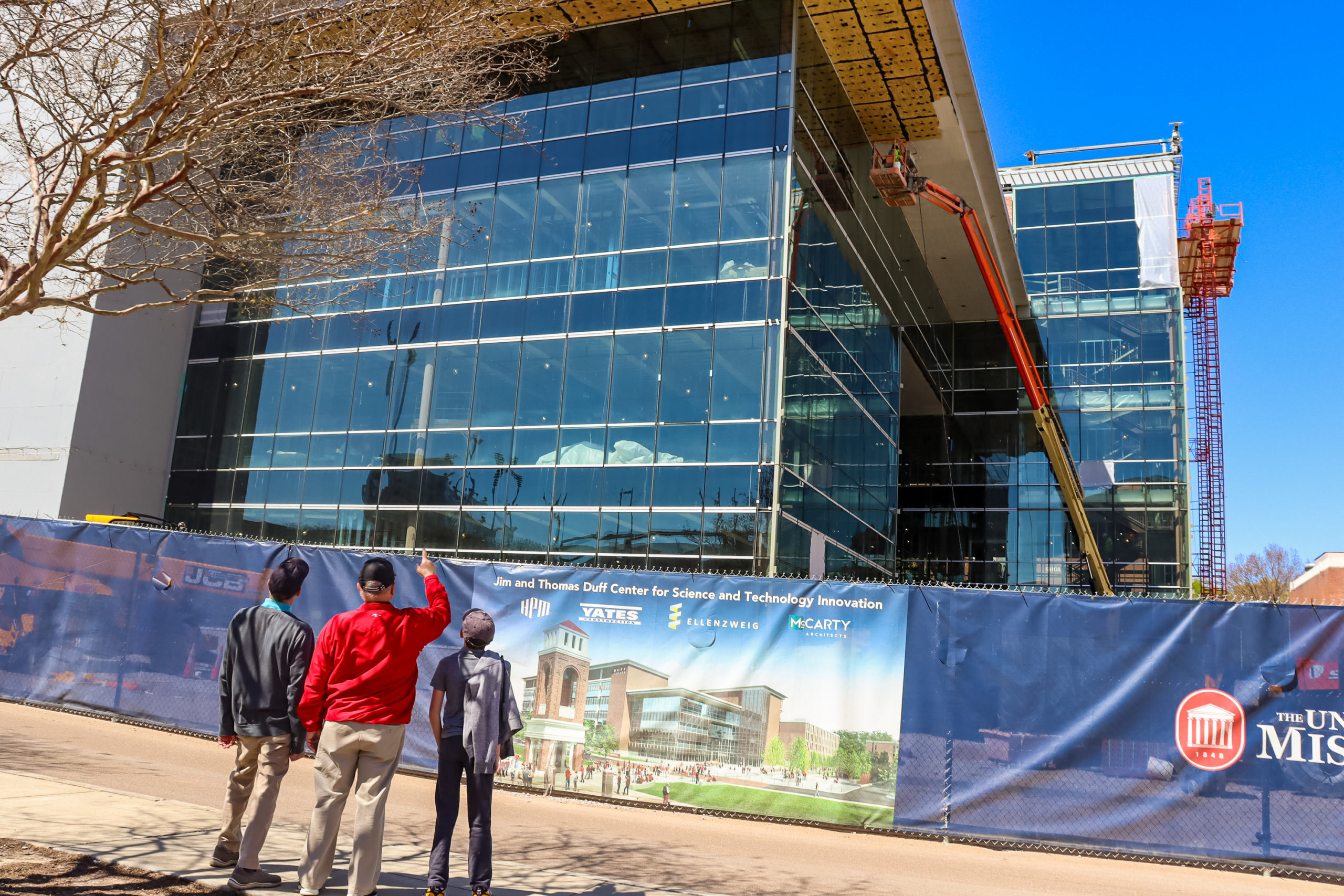Sixue Chen believes the lab equipment at the Jim and Thomas Duff Center for Science and Technology Innovation at the University of Mississippi will revolutionize teaching.
The 204,000-square-foot building — the largest single construction project in campus history — is on schedule to open in 2024 and needs equipment for its many advanced classrooms and laboratories. The Duff Center will have a low student-instructor ratio and be set up for active learning and interdisciplinary teaching, with various disciplines located throughout the building.
 “Learning how robots work more efficiently and precisely than humans in science labs puts our students at the forefront of state-of-the-art technologies and science,” said Chen, UM’s chair and professor of biology. “Private support will have a completely game-changing impact, enabling our next generation to be leaders in frontier areas of biology and medicine.”
“Learning how robots work more efficiently and precisely than humans in science labs puts our students at the forefront of state-of-the-art technologies and science,” said Chen, UM’s chair and professor of biology. “Private support will have a completely game-changing impact, enabling our next generation to be leaders in frontier areas of biology and medicine.”
Donors who invest in equipment will be recognized by naming of labs and classrooms in the Duff Center.
There are opportunities to fund new equipment for the three natural science departments.
- Biology has over $1 million in equipment needs for the increased number of teaching labs offered in the new building. Some examples:
- A liquid-handling robot and genetic system ($400,000) enables students to quickly prepare samples for genetic sequencing and screenings.
- Donations totaling $400,000 will modernize one of the university’s most popular science courses, Human Anatomy and Physiology.
- With DIC/fluorescence microscopes ($216,000), students can observe detailed cellular structures, native biomolecules and marker fluorescence proteins.
- Chemistry labs support all the STEM and pre-health professional students, producing a $1.2 million need for equipment. Among examples:
- Nuclear magnetic resonance (NMR) spectrometers ($330,000) train future scientists and pre-health professionals who will use MRI imaging techniques for diagnostic purposes.
- Additional handheld digital data-gathering devices ($50,000) allow students to focus more on the science that is happening than the logistics of gathering the data.
- Organic chemistry labs with gas chromatographs and Fourier Transform Infrared Spectrometers ($250,000) will increase student competence in separating mixtures and solutions, identifying components, monitoring reaction kinetics and deducing reaction mechanisms.
- With a total investment of $800,000, Physics demonstration equipment and essential technology can match the state-of-the-art spaces. Some examples:
- Ranging from $5,000 to $40,000, new demonstration equipment can better support student learning in the basic physics labs.
- A mobile planetarium ($20,000) will improve astronomy classes and help stimulate interest in STEM among Mississippi children.
- Updated computers and software ($100,000) for physics labs will provide the latest technological advances in computer simulation and science.

Jake Bennett, assistant professor of physics and astronomy, said equipment and materials needed for the Duff Center’s TEAL classrooms will produce superior learning environments.
Teaching in TEAL classrooms is much different than the traditional, lecture-style classroom. Instead of receiving lectures, students sit in small groups around circular tables so they can work together on activities or experiments.
“Students and instructors form close, often lasting relationships. It is loud, sometimes chaotic and extremely fun!” said Bennett, adding that the improvement in educational outcomes from TEAL classrooms and lessons is unequivocal.
John Wiginton is coordinator of undergraduate chemistry laboratories.
“Considering our growth in enrollment, we have begun to see longer wait times to access all our equipment,” said Wiginton. “Adding to our inventory will increase time-on-instrument practice with cutting-edge technology, building skills relevant to today’s science careers.”
Lee Cohen, dean of the College of Liberal Arts, said for UM to compete with its peers in recruiting students and offering a world-class teaching and training environment, in addition to the facilities, the university needs the proper equipment in classrooms and labs.
The purpose of higher education is to build the leaders of tomorrow in current fields and those that don’t yet exist, the dean said.
“When you think of the many advances over the past century in science, innovators with elevated knowledge have improved our lives in many ways,” Cohen said. “For example, science has led to the discovery of how to cure and prevent various diseases, how to produce materials in the clothing we wear, enhance the foods we eat, find new forms of energy and gain a better understanding of the universe.”
“It is thrilling to think about what is to come and to think that some of these new discoveries can begin on our campus.”
Gifts of all sizes combine to make these equipment purchases possible, with naming opportunities available at specified levels. For more information on how to invest in equipment needs for the Duff Center, contact Caroline Hourin, associate director of development, at cehourin@olemiss.edu or 662-915-1753.


